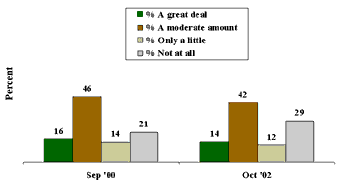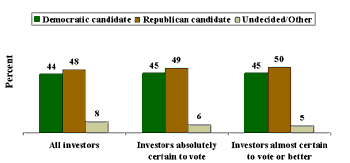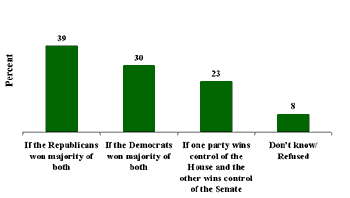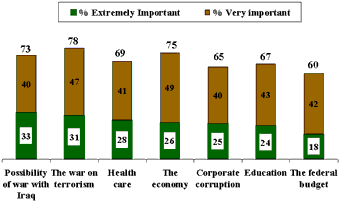GALLUP NEWS SERVICE
PRINCETON, NJ -- According to the latest UBS/Gallup survey of investors' attitudes, about four in 10 investors (41%) believe the congressional elections will have little or no impact on the investment climate in the United States, while 42% say they will have a moderate impact. Just 14% believe the election outcomes will affect the investment climate "a great deal."
| Impact of Election on Investment Climate |
 |
Before the elections in 2000, slightly more investors anticipated that those election results would affect the investment climate: 16% a great deal and 46% a moderate amount. Still, the differences between the findings this year and those two years ago seem small, given that the 2000 elections also included a presidential contest.
Investors include about 40% of Americans who say they have at least $10,000 in investable assets. This group shows a slight preference for Republicans over Democrats in the race for control of the U.S. House of Representatives. Just about half, 48%, say they will vote for the Republican candidate in their district, while 44% expect to vote for the Democratic candidate. Among investors who say they are "absolutely certain to vote," the margin in favor of Republicans is 49% to 45%.
| Vote Preference Among All Investors and Those Most Likely to Vote |
 |
| Oct. 1-17, 2002 |
These results are more Republican than the results of Gallup surveys of all voters across the country. Among all Americans who say they are "absolutely certain to vote," Democrats enjoy an 8-point lead, 50% to 42%. Among a smaller subset of the American public, whom Gallup assesses to be most likely to vote, the Democratic lead is just 3 points, 49% to 46%.
In assessing both the House and the Senate, investors show sharp divisions about which party's victory would be better for the investment climate in the country. About four in 10 (39%) say it would be best if the Republicans won both congressional houses, while three in 10 say that about a Democratic victory for both houses. Another one in four investors (23%) say it would be best if majority control of the Senate and the House were split between the two parties.
| Best Outcome for Investment Climate in the United States |
 |
| Oct. 1-17, 2002 |
About 25% of Democratic voters say it would be best to split majority control of the House and Senate, compared with 21% of Republican voters who feel that way.
War Issues Slightly More Important Than Domestic Issues in Election Decision
Investors indicate that the war on terrorism and the possibility of war with Iraq loom as slightly more important issues influencing their vote decision than domestic issues, such as health care, corporate corruption, the economy and education.
| Importance of Election Issues |
 |
| Oct. 1-17, 2002 |
Overall, investors are more likely to say that Republicans in Congress, rather than Democrats, are better able to deal with the two war issues. However, on the issues of health care and education, investors show a decided preference for the Democrats.
|
Next, regardless of which congressional candidate you support, please tell me if you think [the Republicans in Congress or the Democrats in Congress -- rotated] would better deal with each of the following issues, or if you think they would deal with them about equally well? |
||||
|
(Sorted by "Advantage") |
Both equally well |
Republicans |
Democrats |
Advantage |
|
% |
% |
% |
% |
|
|
The war on terrorism |
32 |
47 |
16 |
+31 |
|
The possibility of war with Iraq |
23 |
49 |
22 |
+27 |
|
The federal budget |
24 |
39 |
32 |
+7 |
|
The economy |
22 |
38 |
36 |
+2 |
|
Corporate corruption |
32 |
30 |
33 |
-3 |
|
Education |
31 |
23 |
42 |
-19 |
|
Health care |
23 |
22 |
50 |
-28 |
|
+ Advantage indicates Republican lead |
||||
|
- Advantage indicates Democratic lead |
||||
On three other issues, the federal budget, the economy and corporate corruption, investors show no clear preference -- leaning slightly toward the Republicans on the first two, but slightly toward the Democrats on the last one.
Among the general electorate, Gallup Polls have shown a similar pattern, with Republicans enjoying an advantage on foreign policy issues and Democrats an advantage on domestic issues. One major difference, however, is that unlike investors, who see little difference between the two parties on handling the economy, the general public sees the Democrats as better able to handle the economy by an 11-point margin. Among the most likely voters in the general public, that margin declines to just 1 percentage point.
Survey Methods
Results are based on telephone interviews with 1,001 investors -- those who have a minimum of $10,000 in investable assets -- conducted Oct. 1-17, 2002. For results based on the total sample of investors, one can say with 95% confidence that the margin of sampling error is ±3 percentage points. In addition to sampling error, question wording and practical difficulties in conducting surveys can introduce error or bias into the findings of public opinion polls.
